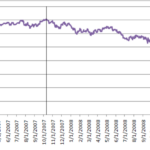European nations poised to fill the gap in maintaining crucial military aircraft amidst ongoing conflict.
- Biden administration rejects sending American contractors to Ukraine for F-16 maintenance due to safety concerns.
- European countries expected to take on maintenance responsibilities for F-16s and other military equipment.
- The first six of 80 promised F-16s arrived in Ukraine in July, but maintenance remains a challenge.
- Concerns raised about potential Russian targeting of American contractors in Ukraine.
- U.S. has not ruled out future contractor deployment, but current safety risks are a major factor.
The Biden administration has decided against sending American contractors to Ukraine to help maintain Western military equipment, including the newly arrived F-16 jet fighters. This decision stems from safety concerns regarding the risks posed by Russian forces targeting American personnel in the region. The discussion about deploying U.S. civilians to assist in maintaining military equipment has been ongoing since the onset of the war, but it has gained urgency with the arrival of the first six F-16s in Ukraine at the end of July. nnThe National Security Council reviewed the proposal but ultimately deemed it too risky, with the intelligence community expressing worries about the safety of American contractors. Instead, the administration hopes that European countries will assume the responsibility for maintaining these aircraft. nnWhile the U.S. has not completely ruled out sending contractors in the future, it is unlikely to happen soon. Recently, Ukraine experienced the loss of its first F-16 during a Russian missile attack, which resulted in the death of a prominent pilot. The cause of the crash is under investigation. nnF-16s are complex aircraft that require skilled maintenance, and typically, a significant number of support personnel are needed for their upkeep. Although the Pentagon is optimistic that Ukrainian forces can manage the F-16s, the reliance on private contractors for servicing remains a critical issue. nnPresident Biden and his national security adviser, Jake Sullivan, have expressed concerns about the Defense Department’s preparedness to respond to potential attacks on American contractors. Currently, only a small number of U.S. diplomats and military personnel are stationed at the U.S. Embassy in Kyiv. nnThe reluctance to send U.S. contractors reflects a broader debate about American involvement in the conflict. Since Russia’s invasion in February 2022, the White House has been cautious about escalating U.S. military presence in Ukraine. nnUkraine is set to receive a mix of older and upgraded F-16s from several European nations, including the Netherlands, Norway, Denmark, and Belgium. The Netherlands has confirmed it will fund a private contract for civilian maintenance support for the Ukrainian Air Force. nnUkrainians have faced challenges in maintaining other U.S.-provided weapons, often relying on remote assistance or shipping equipment abroad for repairs, which delays operational readiness. The situation underscores the critical need for effective maintenance solutions as Ukraine continues to defend its territory against Russian aggression.·
Factuality Level: 8
Factuality Justification: The article provides a detailed account of the U.S. administration’s decision regarding sending contractors to Ukraine for F-16 maintenance, supported by quotes from officials and relevant context. While it is mostly factual, there are minor instances of potential bias in the presentation of opinions from officials, and some background information could be seen as tangential. Overall, it maintains a high level of factual accuracy.·
Noise Level: 7
Noise Justification: The article provides relevant information about the U.S. decision regarding sending contractors to Ukraine for F-16 maintenance, discusses safety concerns, and highlights the implications for Ukraine’s defense. It stays on topic and supports its claims with evidence from officials. However, it lacks deeper analysis of long-term trends or systemic implications, which prevents it from achieving a higher score.·
Private Companies: civilian maintenance company
Key People: Rustem Umerov (Ukrainian Defense Minister), Oleksandr Lytvynenko (Secretary of Ukraine’s National Security and Defense Council), Jake Sullivan (National Security Adviser), Onno Eichelsheim (Chief of Defense for the Netherlands)
Financial Relevance: Yes
Financial Markets Impacted: The decision to send American contractors to maintain Western military equipment in Ukraine could potentially impact defense contractor companies and their stocks.
Financial Rating Justification: The article discusses the debate over sending American contractors to maintain F-16 jet fighters and other military weaponry in Ukraine, which could have an impact on defense contractor companies if they are tasked with providing maintenance services. This decision could affect their stock prices and overall financial performance.
Presence Of Extreme Event: Yes
Nature Of Extreme Event: Armed Conflicts and Wars
Impact Rating Of The Extreme Event: Major
Extreme Rating Justification: The article discusses the recent loss of an F-16 jet during a Russian missile barrage, which resulted in the death of a prominent pilot. This indicates significant impact due to loss of life and the ongoing military conflict.·
Move Size: No market move size mentioned.
Sector: Defense
Direction: Down
Magnitude: Large
Affected Instruments: Stocks
 www.wsj.com
www.wsj.com 





